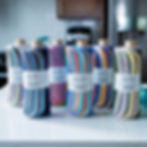Ambrosia
brand rating & evaluation
overall rating:
Top Choice
Our ratings are based on a scale from 1 (Avoid) to 5 (Top Choice). See How We Rate
The Shifting Gaia rating evaluates brands based on sustainable practices, ingredients and materials, and social responsibility, among others. Below are a few factors influencing this brand's score:
certifications:
learn more about these certifications*
overview
sustainability
non-toxic
social responsibility
8.9 out of 10
10 out of 10
7 out of 10
about
Ambrosia is a small, family-run brand offering reusable produce storage bags made from raw flax linen, designed to keep food fresher longer.
highlights
Fully home-compostable product and packaging
Creative solutions for food waste
Small, family-run business
Carbon-neutral shipping and one tree planted
1% for the planet member
Sustainable fabric sourcing
sustainability

score:
8.9 out of 10
details:
Packaging
Ambrosia uses unbleached, compostable packaging materials printed with algae-based inks instead of petroleum-based. This means all boxes or mailers are fully biodegradable – customers can literally toss the packaging into a home compost bin once opened. No plastic mailers, filler, or tape are used, aligning with a zero-waste approach.
Ingredient Sustainability
The core material used in Ambrosia’s bags is flax linen, which is renowned for its sustainability profile. Flax (linen) cultivation generally requires far less irrigation and chemical input than cotton; Ambrosia emphasizes that their flax is “sustainably grown” in European fields with minimal environmental impact. The linen is processed in a raw, unbleached form, meaning the fabric retains its natural beige hue and isn’t treated with chlorine bleach or synthetic dyes.
In addition to linen, Ambrosia pays attention to secondary materials. Each produce bag is fitted with a YKK zipper that is made from recycled materials (the brand notes the use of recycled YKK zippers in their product descriptions on social media). Using recycled zippers reduces the need for new plastic or metal, making the product more sustainable than if it used virgin-sourced hardware.
All bags are sewn and assembled in California with quality in mind, which contributes to longevity. The linen fabric is quite durable (stronger when wet, and naturally resistant to wear), so these bags are built to last for years of regular use.
It’s worth noting that while Ambrosia highlights “sustainably grown” flax, they do not explicitly mention organic certification for the linen. European flax farming is generally environmentally friendlier than conventional cotton, and often flax is grown with few pesticides, but no third-party organic certification (e.g. GOTS) is cited to verify pesticide-free or organic status. The brand instead relies on the reputation of its traditional European linen mills and the inherent sustainability of flax.
Energy Use and Footprint
Ambrosia demonstrates awareness of energy and carbon footprint primarily through its carbon-offsetting initiative and local production model. Manufacturing each bag in California means the sewing process is powered by the local grid; while the brand doesn’t specify using renewable energy at their studio, the scale of production is artisanal (each bag is handcrafted), so energy usage is relatively low-tech (mainly sewing machines and lights).
To counterbalance the carbon emissions associated with both material transport and product shipping, Ambrosia has implemented a tree-planting program for carbon offset. In partnership with Ecodrive, each purchase triggers the planting of a mangrove tree in Kenya or Madagascar.
Waste Management
The very premise of Ambrosia Bags is to reduce food waste – a major environmental issue. By keeping produce fresh for longer, the bags ensure more of what you buy is actually consumed rather than tossed.
From a production standpoint, because the bags are handmade in small batches, fabric waste is likely minimized. The company can cut fabric more judiciously than large factories and adjust their production to demand, avoiding overproduction or large volumes of scrap.
In terms of end-of-life, Ambrosia’s materials make disposal eco-friendly. As noted, the linen bags are compostable once the zipper is removed. Linen will break down in a compost or even if landfilled it will decompose much faster than synthetic fabrics. The packaging is also compostable, so a customer who is done with both box and bag could theoretically compost almost the entire product kit (the zipper would be the only leftover).
Business Model
Ambrosia’s business model is fundamentally about quality over quantity and encouraging sustainable habits rather than overconsumption. Unlike many lifestyle brands that proliferate dozens of product lines or seasonal collections, Ambrosia has a very tight focus: improving food storage to reduce waste. They sell a small selection of bags tailored to different produce types (vegetable, leafy greens, mushrooms, berries) and a bundle set.
non-toxic

score:
10 out of 10
details:
Ambrosia’s products rank very low on toxicity concerns, thanks to the natural and untreated materials used. The primary material, flax linen, is a natural plant fiber that is non-toxic and safe for food contact. Because Ambrosia’s linen is raw and unbleached, it hasn’t been subjected to chlorine bleach (which could leave dioxin residues) or fabric finishing chemicals. There are no synthetic coatings on the bags – in fact they advertise “no plastic, no chemicals” in their storage solution.
The algae-based inks used on the packaging are another win for toxicity – algae inks are biodegradable and free from the heavy metals and VOCs that can be present in conventional inks. So neither the product nor its packaging introduces concerning chemicals into your home.
social responsibility

score:
7 out of 10
details:
First and foremost, the brand is handcrafting its bags in Southern California and paying fair wages. In an era when many textile products are made in low-wage countries with sometimes poor labor conditions, Ambrosia’s choice to keep manufacturing local ensures that workers are protected by strong labor laws and receive a just wage for their craft.
Being a member of 1% for the Planet means they have pledged 1% of sales to environmental or social causes. They chose to direct this giving to Food Forward, a California-based non-profit that recovers surplus produce from farmers markets and orchards to feed communities in need.
The Ecodrive partnership also has a social dimension. Planting mangrove trees in Kenya/Madagascar not only sequesters carbon, but it creates jobs for local communities (as noted, EcoDrive employs local people to hand-plant and monitor the saplings).












